|
|
|
Sort Order |
|
|
|
Items / Page
|
|
|
|
|
|
|
| Srl | Item |
| 1 |
ID:
122665
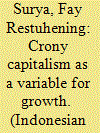

|
|
|
| 2 |
ID:
173916
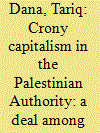

|
|
|
|
|
| Summary/Abstract |
This article interrogates the multifaceted political–economic networks entrenched within the multiple structures of the West Bank-based Palestinian Authority (PA). The main argument of this article is that crony capitalism is a defining feature of the PA’s relations with a handful of capitalists and business groups. The demonstration of this argument is exhibited through the large-scale public and private monopolistic practices in strategic sectors of the Palestinian economy, which function within the framework of Israel’s settler-colonial reality and the persistent patterns of international aid to the occupied West Bank. While acknowledging the existence of cronyism as a feature of the capitalist system in its diverse typologies, crony capitalism may be more pronounced in situations characterised by political uncertainty, whereby political–business collusion strategizes the expansion of neo-patrimonial networks and rent-seeking opportunities as a meta-mechanism for social control and political stabilisation. In the Occupied Palestinian Territories, crony capitalism was developed as part of the political allegiances and economic alliances that underpin the structures created by the Oslo process, which are fostered by Israeli policies and the international donor community to maintain the cohesiveness of the PA regime.
|
|
|
|
|
|
|
|
|
|
|
|
|
|
|
|
| 3 |
ID:
187048
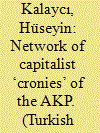

|
|
|
|
|
| Summary/Abstract |
The upgrading of Başakşehir from a quarter to a district is related to the transformation of İstanbul Başakşehir Football Club from a football club into a politico-cultural project carried out capitalist cronies attached to the governing (Justice and Development Party). ‘Rent-seeking’ activities in cultural areas are usually neglected or, if anything, considered the indirect results of developments in the financial or economic field. Sports in general and football in particular are the best examples of this omission. This article is directed towards filling this gap by taking Başakşehirspor as a venue to explore how ‘rent-seeking relations’ expand and gain a foothold in culturally-oriented economic fields in order to bolster their already established control over networks of cronies in the political and economic system. In the literature, a common characteristic of crony capitalism, network formation, has not received sufficient attention. The available research, focusing on whether crony capitalism merely replaces corruption, clientelism, or both, overlooks certain kinds of methodological approaches that could be fruitful, such as network analysis. An analysis of how this network revolves around Başakşehir and of its transformation under AKP governance will provide a basis to show how Başakşehirspor replicates the same practices of network formation.
|
|
|
|
|
|
|
|
|
|
|
|
|
|
|
|
| 4 |
ID:
096599


|
|
|
|
|
| Publication |
2010.
|
| Summary/Abstract |
Business interests are overrepresented in Hong Kong's nominally democratic political institutions. Many in Hong Kong perceive this as evidence of the existence of "collusion between government and business," a phenomenon that has stirred public concerns in the city since its sovereignty transfer. Although anecdotal accounts abound, no systematic analysis has been conducted to evaluate the validity of this perception. In this article I use a rich firm-level dataset to offer the first systematic assessment of the effects of political connections on firm performance in Hong Kong. I define politically connected firms as firms that have stakeholders concurrently holding a seat on the Election Committee, a constitutional body that elects the city's chief executive. I found evidence, though not overwhelming, consistent with the "collusion" hypothesis: political connections do improve firm performance measured by return on equity and market-to-book ratio. The improvement is unlikely due to unobserved confounding factors such as firms' inherent ability. As for the origin of the political connections, the data show that a firm's economic power has little predictive value of its connections to the Election Committee. Rather, number of employees matters; firms that hire fewer workers were more likely to gain a seat on the 1997 Election Committee. This result may suggest that Beijing plays a more dominant role in the formation of political connections-that serve Beijing's co-optation needs rather than the interests of powerful firms that may have a desire to "capture" the state.
|
|
|
|
|
|
|
|
|
|
|
|
|
|
|
|
| 5 |
ID:
138988
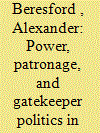

|
|
|
|
|
| Summary/Abstract |
This article examines the rise of gatekeeper politics within the ANC, drawing on an analysis of ANC discussion documents, key informant interviews with senior party officials, and interviews and observations from the ANC’s centenary policy conference. On the basis of this material, I identify the symptoms and consequences of gatekeeper politics, including the growth of patronage networks, crony capitalism, and bitter factional struggles within the party. Rather than resembling some uniquely “African” form of political aberration and breakdown, gatekeeper politics should be viewed within a broader spectrum of patronage politics evident elsewhere in the world, because it is intrinsically bound up with the development of capitalism. Political leaders who occupy positions of authority in the party or public service act as gatekeepers by regulating access to the resources and opportunities that they control. A volatile politics of inclusion and exclusion emerges and provokes bitter factional struggles within the ANC as rival elites compete for power. The rise of gatekeeper politics undermines both the organizational integrity of the ANC and its capacity to deliver on its electoral mandate. It can also depoliticize social injustice in post-apartheid South Africa by co-opting popular struggles over access to resources that might otherwise challenge the political status quo.
|
|
|
|
|
|
|
|
|
|
|
|
|
|
|
|
| 6 |
ID:
190689
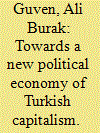

|
|
|
|
|
| Summary/Abstract |
Political economists investigating Turkey's turbulent path in recent years predominantly work from within three different characterizations of Turkish capitalism: authoritarian neoliberalism, crony capitalism, and state capitalism. This article critically reviews these competing visions and identifies directions for future research. I argue that, fundamental differences aside, these approaches together illustrate the indispensability of a political economy perspective for comprehending Turkey’s current predicament, in particular its authoritarian turn and ongoing systemic crisis. Yet meeting the potential of this research program also requires resisting rigid macro conceptualizations and aiming instead for empirically rich analyses of nuts-and-bolts phenomena such as changes in the class map, sectoral regimes, and challenges of development, with a view to identifying feasible strategies of renewal post-AKP.
|
|
|
|
|
|
|
|
|
|
|
|
|
|
|
|
|
|
|
|
|